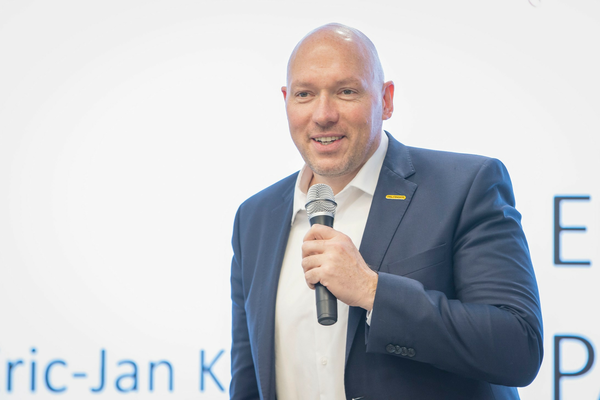
Interview with André Kluge VP EMEA Sales & Service Product Divisions
In an interview with ir.news, André Kluge, Vice President EMEA Sales & Service Product Divisions, describes the current situation in the EMEA region and how the market is expected to develop in the future.
ir.news: PALFINGER AG achieved record revenue and EBIT in the first half of 2023. The economic situation in Europe, however, remains tense, with interest rates rising and inflation still very high. How will this influence demand and new orders at PALFINGER over the next few months?
Kluge: The first half of 2023 was exceptional, especially after a volatile year in 2022. It was back in 2022 that we worked to improve our profitability by introducing dynamic pricing. Existing orders were also renegotiated to cushion the cost increases.
The coming year won't be easy either and the market has changed yet again. Many customers are unsure of the future, investments are being postponed and incoming orders are at a low level. That is why we and our partners are trying to take every opportunity on the markets.
ir.news: What are the reasons for the lower order intake? Is it due to the development of certain industries, such as the decline in construction, or what is the reason?
Kluge: One reason is high inflation, which in turn has a negative impact on the construction industry. Plus, as a result of the higher interest rates, it is becoming almost impossible for most first-time buyers to afford their own house or apartment. This may bring the entire construction industry to a standstill. Because there are currently only a handful of new construction projects, there is less demand for transport of raw materials to construction sites. Our customers are postponing their investments in the hope of potential price reductions and a better economic environment.

ir.news: You've talked about the reasons why markets in Europe are declining and fewer orders are being generated. PALFINGER announced in the first quarter that it is targeting revenue of EUR 2.4 billion for the full year 2023. Can we still achieve this despite experiencing difficult times?
Kluge: Our order book is still looking good, and we now have visibility that takes us through until Q1 2024. So yes, our guidance of EUR 2.4 billion is still feasible.
ir.news: If we now look from the present into the future, which industries or which product lines do you think have the greatest potential for PALFINGER, also in terms of reaching our goal of EUR 3 billion in revenue in 2027?
Kluge: On the one hand, we see a downward trend in the construction and transportation industries. At the same time, however, there is another upward trend in the same industries.
This is as a result of the European Union's Green Deal, which has the goal of achieving climate neutrality by 2050 and is bringing about changes in the construction industry. What we are going to see, among other things, is the installation of new window systems, heating systems, heat pumps and photovoltaic systems that contribute to the carbon neutrality of houses. This will also change and expand our core business. Larger cranes, special cranes and special lifting solutions are going to be needed to meet these new requirements.
Another change that is coming is drive by wire. The problem in each market is a shortage of skilled workers, which is why we are trying to find ways to help our customers automate as much as possible, including cranes that load and unload remotely. In the PALFINGER Marine sector, we already have cranes that can be controlled remotely. I can imagine that this technology could become relevant across our whole product portfolio in the future.
ir.news: The EMEA region consists of more than just Europe. How will the other economic regions such as the Middle East, Australia and Africa develop in the future and how important are these markets for PALFINGER now and in the future?
Kluge: Over the past few decades, we have increasingly focused on Europe. The markets in the Middle East, Africa and Australia were always a good addition to our business, but not regions of major focus. We have already started to adjust our strategy, because from my point of view the Middle East is a booming region, particularly with a view to the future. The Middle East is planning huge investments in infrastructure projects, from which PALFINGER can also benefit. Our entire product portfolio is needed there to implement these projects. We need to have a larger footprint in this region, and perhaps also invest more in this market. That's why we're opening an office in Dubai in October to be closer to the market and our customers.
Australia is a large and very strong market and has abundant raw materials. PALFINGER has a major dealer in Queensland and is currently considering opening another service center in New South Wales. This could lead to a doubling of our revenue in Australia.
With its sheer size and large population, the African market also offers potential, although the situation in each country is often subject to major fluctuations. We want to focus on the North and West African countries and increase our presence there.
I am confident that we will also generate more revenue by 2030 in the regions in which we are still working on ramping up our activities.
